Heat pumps are really clever devices, and are predicted to become one of the most installed items in US homes in the next few years. That’s because they serve a dual purpose of both cooling and heating your home, depending on the temperature.
Rather than a separate air conditioning system and a furnace or electric heater, you can use a heat pump to make sure your home is kept at a comfortable temperature all year round. Plus, a heat pump can even save you money, without losing any efficiency.
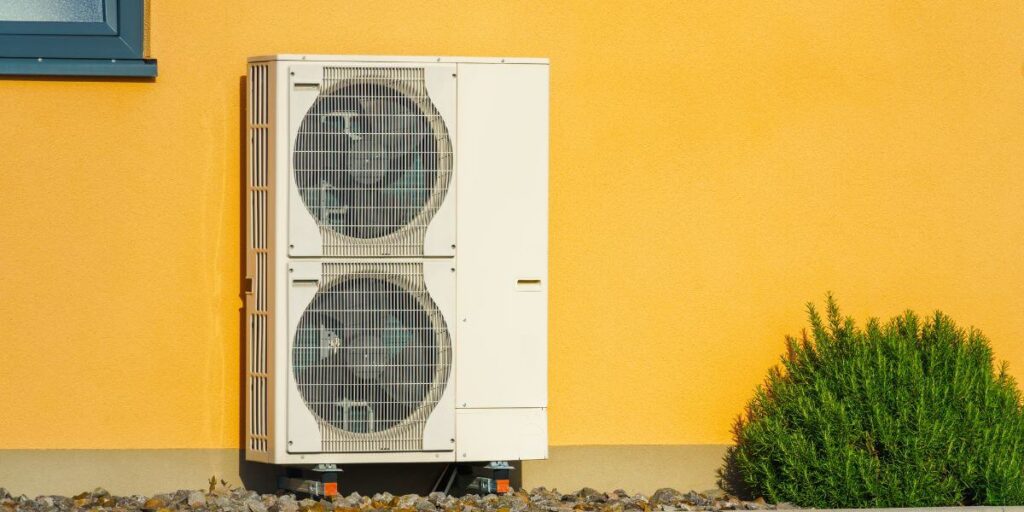
Sounds interesting, right? Let’s take a look at how they work, how much power they use, and how much you could save by switching to a heat pump.
How Are Heat Pumps Powered?
Heat pumps are powered by electricity. There are two main units to a heat pump – an external condenser and an internal unit that then drives the cooled or heated air around the home. Refrigerating coolant passes between them, transferring heat energy.
Basically, a heat pump doesn’t create cold or hot air. Instead, it moves heat around. During colder months, it will extract heat from the outside air (because, even when it’s cold, there’s always heat energy) and then, through compression, create more heat which it then moves into your home.
The reverse happens during warmer months. Switch the heat pump to cooling mode and it will extract the heat energy from inside your home, and remove it to the outside, cooling the air.
This is actually the same process as an air conditioner – people often think that AC units create cold air, but instead, they’re simply moving the heat to the outside of your home, which is why they need vents.
The fact that heat pumps are powered by electricity gives them a huge advantage over gas furnaces though since globally we’re getting much better at creating electricity through renewable sources like solar and wind.
The combination of more efficient heating through electrical heat pumps, and a bright future for potentially cheaper electrical energy, means we may see our bills become much lower in a few years’ time.
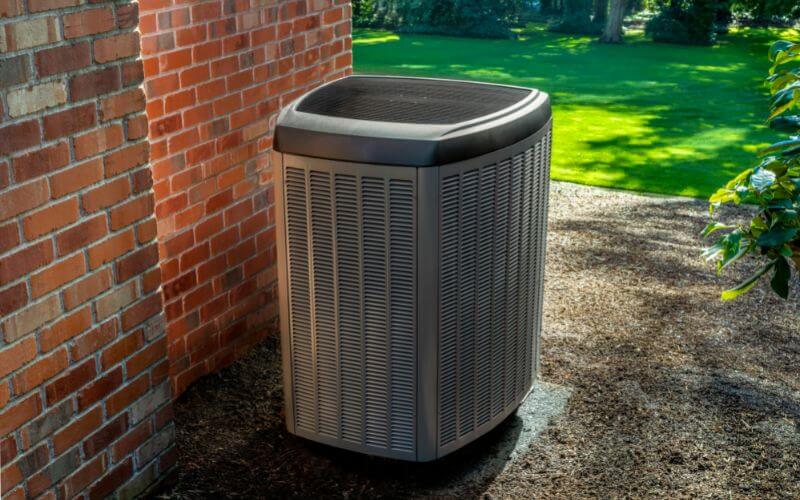
How Does A Heat Pump Save Electricity?
A heat pump does save you energy when in heating mode. In cooling mode, it will use a similar amount of electricity as an air conditioner would, as they work in the same way. So your energy savings are going to come more during the winter months when you want to heat your home.
That’s because, instead of generating heat (which is a costly process), it is moving heat from one location to another. It also means there’s a lot less wasted energy too – for every 1 kilowatt of energy used by a heat pump, it is capable of moving around 3 to 4 times that amount of heat into your home.
How Much Power Does A Heat Pump Use?
A heat pump uses between 0.8 and 5.1 kilowatt-hours of electricity per hour to run. The exact amount depends on a number of factors. Some heat pumps are more efficient, while there are different sizes available depending on the size of your home as well.
Starting wattage is also something to consider though – this is the amount of power needed for the first 2-3 seconds of operation in order to kick-start the heat pump and get it working. If your home ever has a power cut and you want to run your heat pump on a generator, you’ll need to make sure the generator has the capacity to handle the starting wattage, which is normally between 2.4 and 15.3 kWh.
These are all average figures and will balance out across the year, but bear in mind that you may need to run your heat pump for longer depending on the climate, especially in winter if it is particularly cold outside, where the heat pump has to work extra-hard to extract heat from the air.
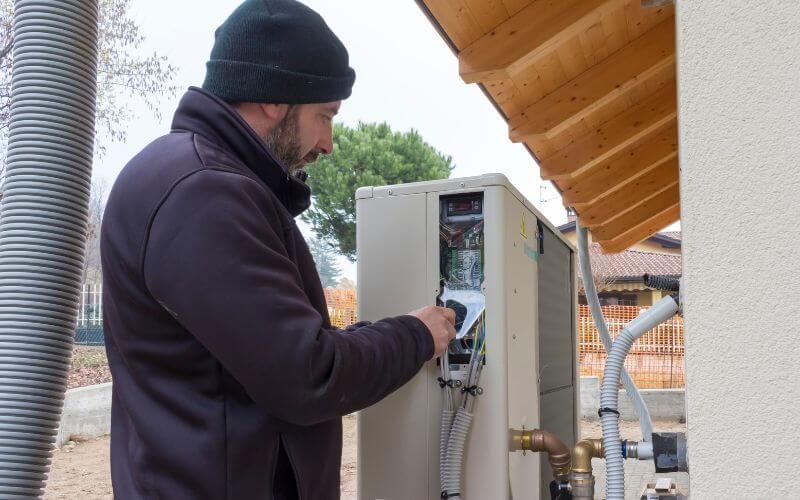
SEER Rating
Heat pumps aren’t generally sold with a rated maximum wattage. Instead, they tend to be advertised with their SEER rating – that’s their Seasonal Energy Efficiency Rating.
The higher the SEER rating then the more efficient it is. Most home heat pumps range from 13 to 24, but there have been some units produced with SEER ratings as high as 42 (source).
You can work out the wattage of a heat pump if you know the SEER rating and the capacity of the heat pump (in British Thermal Units/BTU).
It’s a bit of a complicated two-step formula, but you need to first work out the EER:
-0.02 x SEER2 + 1.12 x SEER
Then you divide the capacity of the heat pump by the EER to get the total wattage.
| Heat Pump Size | 14 SEER | 16 SEER | 18 SEER | 20 SEER | 22 SEER |
|---|---|---|---|---|---|
| 12,000 BTU | 1,020 watts | 938 watts | 877 watts | 833 watts | 802 watts |
| 18,000 BTU | 1,531 watts | 1,406 watts | 1,316 watts | 1,250 watts | 1,203 watts |
| 24,000 BTU | 2,041 watts | 1,875 watts | 1,754 watts | 1,667 watts | 1,604 watts |
| 30,000 BTU | 2,551 watts | 2,344 watts | 2,193 watts | 2,083 watts | 2,005 watts |
| 36,000 BTU | 3,061 watts | 2,813 watts | 2,632 watts | 2,500 watts | 2,406 watts |
| 42,000 BTU | 3,571 watts | 3,281 watts | 3,070 watts | 2,917 watts | 2,807 watts |
| 48,000 BTU | 4,082 watts | 3,750 watts | 3,509 watts | 3,333 watts | 3,209 watts |
| 54,000 BTU | 4,592 watts | 4,219 watts | 3,947 watts | 3,750 watts | 3,610 watts |
| 60,000 BTU | 5,102 watts | 4,688 watts | 4,386 watts | 4,167 watts | 4,011 watts |
As you can tell from this table, there’s a huge range of potential wattages being consumed depending on your heat pump model and capacity, with some using more than 5 times the power of the smallest, most efficient models.
Does A Heat Pump Use More Electricity Heating or Cooling?
A heat pump will normally use more electricity when it is heating your home, rather than cooling it. That’s because in cooling mode it doesn’t have to work as hard to extract heat from the atmosphere – there’s an abundance. In winter, there is less heat outside to pump into your home.
The result is that it has to work harder to get the heat energy needed to create sufficient heat to warm your home. How much harder it has to work will vary depending on the model and, of course, on where you live and the climate. There’s no simple answer to give here because there are so many variants.
The other key question that also doesn’t have a clear answer is whether a heat pump is all you need, or whether you’ll need to supplement it. And that again depends on a few factors, primarily where you live.
If you live somewhere where it is extremely hot in the summer, then a heat pump may not create the cooling atmosphere you’re looking for throughout your home. It’ll work well, but you might want to add a couple of electric fans to help improve the cooler airflow.
Read more: How much electricity does a fan use?
And conversely, if you live somewhere with really cold winters, you will likely need supplementary heating. That might mean relying on a gas furnace still, or buying an electric panel heater just for those occasional times where you want a little extra heat.
Read more: What type of heater is cheapest to run?
Heat pumps are also designed primarily to heat the air, although some do heat water as well. But if you want enough hot water for regular baths then you might need a gas furnace still. Most showers are electric these days and so you shouldn’t still need a furnace for showering at least.
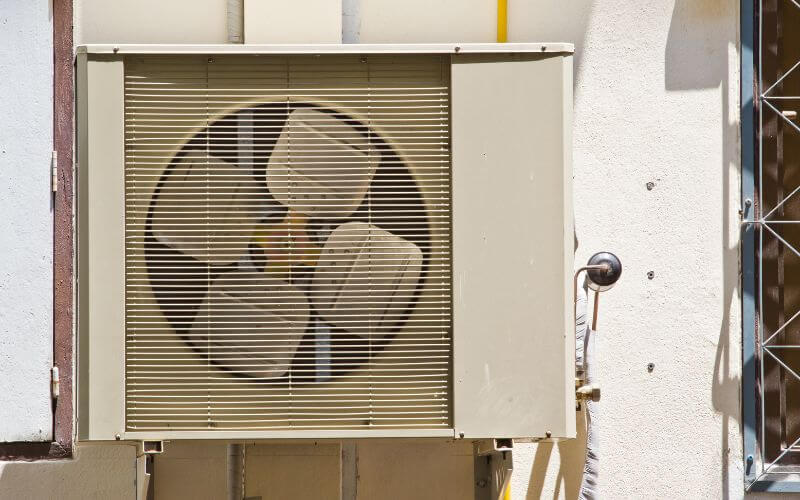
Does A Heat Pump Use Less Electricity Than An Air Conditioner?
Heat pumps use a similar amount of electricity to equivalent air conditioners when they’re in cooling mode. They work in the same way – extracting heat energy from the air inside the home, and pumping it outside.
So is it worth replacing an air conditioning unit with a heat pump, if they don’t save you electricity and aren’t any more efficient at cooling either? Well yes, if you also need to heat your home. Having a heat pump rather than separate air conditioning and heating systems not only saves you money on heating bills, but it’s easier (and cheaper) to maintain one system too.
How Much Does It Cost To Run A Heat Pump?
The cost to run a heat pump depends on how efficient the heat pump is, and its capacity. Based on an average of $0.14 per kWh, expect it to cost somewhere between 11 and 71.4 cents per hour to run.
You can calculate how much a heat pump costs to run based on the total wattage, which you can work out from the SEER and BTU ratings as discussed above.
Once you have the total watts, divide it by 1,000 to get the kilowatt-hours, and then multiply that by your local electricity cost per kWh. Or, use the calculator below…
Heat Pump Cost Calculator
Will A Heat Pump Save You Money?
A heat pump likely won’t save you money against an air conditioner, but will normally save you money versus a gas furnace or other space heating devices. How much varies greatly depending on your local gas and electricity costs, the size of your home, and more.
It’s hard to even give an average because of how many variants there are in play, but it would be reasonable for many people to expect savings of around $100 per year on your bills if you switch to a heat pump.
It’s not just about savings though, but also your impact on the planet. Because electricity is now often being produced using renewable methods, it is a much greener energy than natural gas.
Also if you do want to work out the cost of a heat pump versus your gas consumption, it’s important to factor in efficiency.
A good gas furnace is 95% efficient, meaning that for every 1 unit of energy used you get 0.95 units of heat energy. Meanwhile, most heat pumps are 200-300% efficient or more, meaning for every 1 kWh of electricity used you get the equivalent of 2-3 kilowatts of heat energy.

Are Heat Pumps Worth It?
Heat pumps are worth the investment if you want to save a small amount of money on your heating bills, consolidate your heating and cooling systems into one device for maintenance, and if you want to reduce your impact on the planet.
They are expensive, and so if you are only motivated by cost then it might not be worth it to you immediately. But when your AC or gas furnace next breaks down and needs replacing anyway, you may wish to look at a heat pump as an alternative.
Split Air Conditioner Heat Pump

- Designed for home and business
- With air conditioning, a built-in heat pump, dehumidifier, fan and turbo function
- 5-year warranty, with free technical & installation support included
How To Run A Heat Pump Most Efficiently
Here are some key tips to make sure you’re using a heat pump as efficiently as possible.
1. Run The Heat Pump All Day
Heat pumps are designed to be run all day, rather than being switched on during mornings and evenings only. They take time to get up and running and will use more power to do so – a lot more, to start running from being completely switched off. So try to leave it running at all times.
2. Find A Temperature And Stick With It
A heat pump isn’t designed to add heat or add coolant, but instead to manage energy levels to maintain a temperature. So find a comfortable temperature and stick with it – don’t keep raising it or lowering it by a few degrees or you’ll make it work much harder to keep up with the changes.
3. Insulate Your Home
A common sense point for any heating system, but if you haven’t properly insulated your home then you’re wasting energy with your heat pump. Consider how you can use proper insulation or simple home hacks to keep your home insulated, including adding bubble wrap to windows.
4. Don’t Use A Heat Pump Below 40 Degrees
While it’s best to avoid switching off a heat pump completely, they do become inefficient below 40 degrees Fahrenheit. It becomes too cold for the heat pump to efficiently extra enough heat energy for your home. Consider backup options like 1500W space heaters in extreme temperatures such as this.
5. Maintain It Properly
Just like with any heating or cooling system, you’ll need to maintain it regularly. How you do that will vary depending on the model, so make sure you check the manual and carry out any regular maintenance that you can yourself, or hire a professional heating engineer for full checks and repairs.
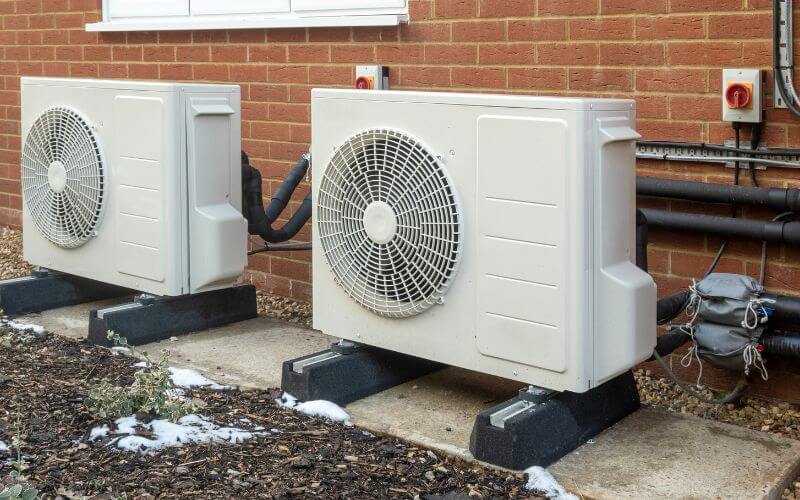
To Conclude
Heat pumps are likely the future of how we cool and heat our homes, considering that they can do both from one device and work using electricity rather than consuming fossil fuels or natural gas.
They will save you some money too, though not a huge sum – but the combination of being more efficient, and cleaner for the planet, makes them an attractive option, especially if you need to replace your existing heating or cooling systems anyway.
